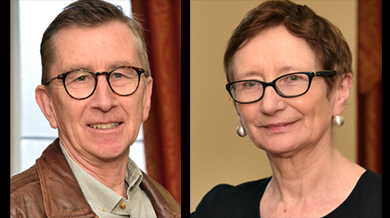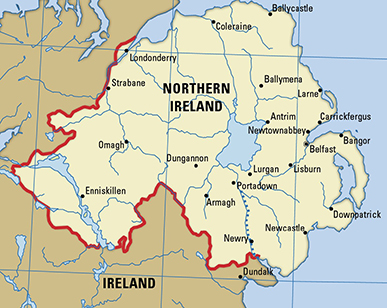Children in the poorest areas are 10 times more likely to be in care, and there are large regional variations in child welfare across the UK according to a major study led by a team from the University of Huddersfield
A DECADE of austerity has led to a vicious circle in child welfare provision where the families and children who need support the most are struggling to get it, according to a major new study involving academics from the University of Huddersfield.
Professor Paul Bywaters has led the five-year long Child Welfare Inequalities Project (CWIP), which has now presented its final report. It finds that there are large inequalities between local authorities in the proportion of children in care or investigated for child abuse or neglect, with families in poorest neighbourhoods over 10 times more likely to be separated from their children than those in the wealthiest.
Study Social Work at Huddersfield
 Professor Paul Bywaters and Professor Brid Featherstone
Professor Paul Bywaters and Professor Brid Featherstone Austerity pushes local authorities to prioritise children in care over family support
Families in the most deprived neighbourhoods have fared particularly badly under austerity policies. Insecure, low paid work and a hostile approach to providing in-work or out-of-work benefits has been coupled with a growing crisis of housing quality, affordability and stability and exacerbated by cuts in allied services provided by the voluntary sector. COVID-19 has reinforced these inequalities.
And CWIP's report also reveals that in response to large cuts in the funding of local government in England, the proportion of children's services budgets being spent on keeping families together has fallen by a third, while more is being devoted to children in care or investigating whether children need to be protected.
The project has involved Professor Bywaters, the University's Professor Brid Featherstone, six other UK universities and the Nuffield Foundation, which provided funding of over £650,000.
"What's unique is that no one's looked at the children's social care system as an issue of inequality," says Professor Bywaters, who was a social worker before moving into academia, where he is now in the University's Centre for Applied Childhood, Youth and Family Research.
"People are used to thinking about health and educational inequalities for children, what we have shown is that there are profound inequalities in children's social care as well.
"We think this picture of rising numbers of investigations and children in care calls for a fundamental rethink of how children's services are delivered and what the priorities are.
"The largest cuts have fallen on the most deprived local authorities in the last 10 years. On average, the authorities with the largest proportion of families living in poverty have seen the biggest cuts in support services. That's why it's a vicious circle - the families and local authorities in the most difficult circumstances have taken the biggest hits from austerity. That's ratcheted up the pressures on families and on services as well."
 Northern Ireland - highest level of child poverty in the UK, but the lowest proportion of children in care
Northern Ireland - highest level of child poverty in the UK, but the lowest proportion of children in care Marked variations in child welfare across the UK
Other findings from the CWIP report include that Northern Ireland, with the highest level of child poverty of the four countries in the UK, has the lowest proportion of children in care or on the child protection register. The research team found evidence that this reflects stronger support from extended families and strong local communities in the province.
"We found that less money per child is spent on children's social care, but key factors are that extended family and community support is stronger in Northern Ireland than the other countries. That is echoed by the children's services provided in Northern Ireland, which have paid more attention to poverty and family material circumstances. It is closer to those communities where families are doing the best they can to look after themselves.
"Findings across the four UK countries reinforce the importance of supporting families better"
"Contrast that with England, where pressures and policies have meant that many social workers have become somewhat distant from the communities where they work and can be viewed with suspicion by families. Too often they are not trusted, not seen as a source of help. That has a negative effect on the numbers of children in care.
The CWIP research has also had an impact in Scotland, where an independent care review commissioned by the Scottish government drew upon the findings. A greater emphasis is being placed on maintaining children's relationships with their families and reducing the numbers of children in care.
 Glasgow has reduced the number of children in care by 500 and doubled spending on family support
Glasgow has reduced the number of children in care by 500 and doubled spending on family support Glasgow approach shows possible solution
The CWIP has worked closely with Glasgow City Council, which largely due to significant levels of poverty had the highest proportion of children in care of any local authority in the UK when the research began.
"They have been working very hard over last four years to change focus in services," says Professor Bywaters. "They have reduced the number of children in care by 500 and doubled spending on family support. This has had a major effect on reducing numbers of children entering care by 60 per cent and number of placement moves for children in care by 70 per cent.
"They have gone from a vicious to a virtuous circle. They have not taken as many children into care, so social workers have more time to spend with the families they are working with. They can work to keep relationships going and shift funding to supporting families staying together, which is better for children in all sorts of ways."
Rob Street, Director of Justice at the Nuffield Foundation said: "Being placed on the child protection register or taken into care are among the most profound interventions the State can have on a child's life, so we want to be confident that these interventions are being used as fairly and equitably as possible.
"This major study finds that the rate of intervention is markedly affected both by the socio-economic circumstances of families and neighbourhoods, and by the resources and priorities of local services. In shining a light on these issues - and making recommendations for change - the research provides a new way to think about children's social care, and supports both the Foundation's and the Nuffield Family Justice Observatory's mission to improve the lives of children and families by putting research and evidence at the heart of the family justice system."
Ray Jones, Professor of Social Work at Kingston University and St George's, University of London, has a 50-year career in social work and praises the CWIP report for highlighting the effects of the inequalities around the UK.
"The study undertaken by the University of Huddersfield, along with colleagues elsewhere, shows the awful consequence of politically-chosen austerity targeting poor families and communities.
"There has never been such a time when poor children and families were intentionally made more vulnerable, and where the help they might receive has been so reduced and retracted. In future years, it will be reflected upon as a scandal which was neither inevitable or necessary. This research, led by the University of Huddersfield, has flagged the urgent need for change in policies and practice impinging on poor children and families."






